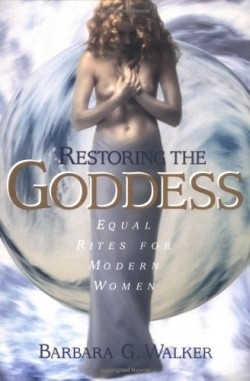Restoring the Goddess
Equal Rites for Modern Women
Appreciation and worship in the Western world of a Goddess, rather than a Judeo-Christian God, is not a new idea. Boston College’s Mary Daly has written for decades about incorporating a female deity into our spiritual realm, and Goddess-based products, from candleholders and earrings to bumper stickers and glassware, have moved beyond New Age bookstores and boutiques into more mainstream shops. Despite this prevalence of Goddess literature and goods, Walker puts a fresh and interesting spin on matriarchal religion, recasting the Genesis story and shaking up standard theological thought.
Author of the wonderfully original Feminist Fairy Tales, Walker begins this religious exploration with, not surprisingly, an early interaction with a priest, who tells her that the Bible is written by God and is therefore the truth, because God would never lie. Like a child who begins to wonder how a department store Santa Claus and a mall Santa can exist at the same time, Walker became suspicious when she began reading the Bible for herself, questioning the book’s very first lines. This childhood awakening later combined with her deep passion for feminism, leading the author to suggest a different religious path than most Western women have walked. Walker says that in place of theology women should study “thealogy,” replacing academic study of God with an understanding that incorporates scientific thought, psychobiology and the symbolic nature of religion. Rather than simply replacing a traditionally male deity with a female, Walker’s thealogy calls for reverence of a personification of the Earth, long regarded as feminine.
With a writing style that mixes personal rumination with scholarly perspective, Walker’s intelligent and controversial argument is well posited and extremely persuasive. She provides numerous examples of ancient Goddess worship and demonstrates how primal religious sensibility can be redefined to fit into contemporary life. Especially refreshing is Walker’s inclusion of men, and the possibility that a Goddess movement need not divide the sexes on the already well-worn gender battleground. She writes, “Patriarchy also has fragmented the family and separated people; there’s always a we-and-they dichotomy. I think the Goddess movement can work, first through women, then by extension through all humanity, to bring a new sense of family. We have to learn to live together.”
Reviewed by
Elizabeth Millard
Disclosure: This article is not an endorsement, but a review. The publisher of this book provided free copies of the book to have their book reviewed by a professional reviewer. No fee was paid by the publisher for this review. Foreword Reviews only recommends books that we love. Foreword Magazine, Inc. is disclosing this in accordance with the Federal Trade Commission’s 16 CFR, Part 255.

